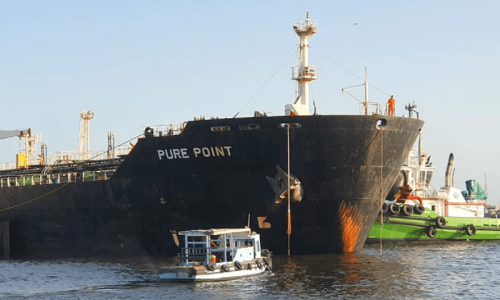KARACHI: People looking for a silver lining to the dark cloud of the economy have set off fireworks to celebrate the arrival of the “discounted” crude oil from Russia.
But analysts warn the celebrations are premature. Based on the little information that Minister of State for Petroleum Musadik Malik has offered on the import of 45,000 tonnes of Russian crude oil in a mystery-shrouded deal between the two governments, energy sector experts believe the move is unlikely to bring down the retail prices of petroleum products — at least in the short term.
“I don’t expect the price at petrol pumps to go down because of Russian oil,” said energy sector analyst Yousuf M. Farooq while speaking to Dawn on Wednesday.
First off, the first shipment — which arrived on Sunday as part of a 100,000-tonne crude oil deal that Pakistan signed with Russia at an undisclosed price two months ago — constitutes a negligible fraction of the national fuel consumption.
But more important is the fact that Russian crude oil is of a heavier grade that yields after refining a substantially high proportion of furnace oil — a product that has few takers in Pakistan.
Other major reasons that should give pause to early celebrations, according to Mr Farooq, are that Russian oil’s freight cost is higher than its alternatives while the quantum of discount is also shrinking by the day, thanks to a downswing in global energy prices since April.
In an interview with Reuters, Mr Malik said the government was aiming to replace one-third of the country’s total oil imports with Russian crude.
But such a shift to Urals oil, which is the reference brand for the Russian export oil mixture, will mean a sudden jump in furnace oil production by the five domestic refineries.
Furnace oil is one of the many products that refineries obtain by processing crude oil. Unlike the raw material sourced from Saudi Arabia and the United Arab Emirates that produces between 25 per cent and 30pc of furnace oil, up to 50pc of the output of heavier-grade Urals will be furnace oil.
It would’ve worked out for all stakeholders if Pakistan was still running its power plants on furnace oil. But furnace oil has largely been phased out from the national power mix given its steep costs. Only 2.2pc of total electricity produced in April originated from furnace oil–based independent power plants (IPPs).
These plants are rarely operational now because the country’s sole electricity purchaser relies on a merit order to despatch all IPPs, including those on cheaper fuel sources, in the ascending order of price per unit.
No wonder then refineries have resorted to temporary shutdowns in recent times because of “ullage constraints” arising out of low demand for furnace oil. In simple words, refineries often run out of empty space in their storage tanks because there aren’t many buyers of furnace oil in the country. Since furnace oil is an unavoidable product of the refining process, refineries are often forced to reduce their overall operations.
As a result, refineries end up producing smaller quantities of petrol, diesel and jet fuels for domestic supplies, which inadvertently leads to the country’s higher dependence on imported retail fuels.
A veteran of the refining industry told Dawn that currently 200,000 tonnes of crude oil is lying in “spare” without any buyers.
“Processing Urals may reduce the gross refining margins (GRM) of refineries,” he said while requesting that he not be named.
The GRM, which is the difference between the crude oil price and the total value of petroleum products it produces, will go down in case the share of furnace oil increases in the output from the current 25-30pc level to 50pc.
As per data compiled by AKD Securities, the individual share of furnace oil in the production mix of the five refineries ranged between 19pc and 28pc in 2021-22.
The price difference between furnace oil and petrol right now is around Rs65 per litre, according to Mr Farooq. “So if you make more furnace oil, you’ll lose most of the discount,” he said.
Mr Musadik didn’t respond to a request for comment.
Published in Dawn, June 15th, 2023














































